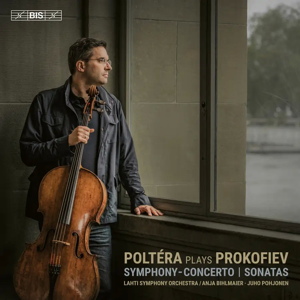
Sergei Prokofiev (1891-1953)
Symphony-Concerto in E minor for cello and orchestra, Op 125 (1951)
Sonata for Cello solo, Op 134 (1952)
Sonata for Cello and Piano in C major, Op 119 (1949)
Christian Poltéra (cello), Juho Pohjonen (piano), Lahti Symphony Orchestra/Anja Bihlmaier
rec. 2021 Sibelius Hall, Lahti, Finland (concerto), 2023 Reitstadel, Neumarkt, Germany (sonatas)
Reviewed in surround sound
BIS BIS-2617 SACD [70]
Sergei Prokofiev’s Symphony-Concerto for cello and orchestra has a long and curious history. It began life in 1933, became the Cello Concerto Op. 58, and was premiered in 1938, but the composer was dissatisfied. When he heard the young Mstislav Rostropovich play it with piano accompaniment, he invited the cellist to help revise the piece. First, though, came the Cello Sonata Op.119, of which Rostropovich gave the first public performance in March 1950. Then it was time for the concerto, revised with Rostropovich’s input, and dedicated to him. He premiered it in February 1952.
The “revision” was so substantial that the piece was called the Second Cello Concerto at the first performance. (The Cello Concerto Op. 58 remains in the composer’s catalogue in its initial form.) The new, or renewed, work was subsequently revised slightly, and retitled Symphony-Concerto. The confusion does not end there, for the Russian title is often wrongly translated as Sinfonia Concertante. A few recordings misleadingly carry that title, but it is the same the work. Rostropovich himself took pains to explain the proper translation into English.
The performance on this disc is very fine indeed. Christian Poltéra’s cello playing is quite splendidly persuasive. In line and phrasing, he “narrates” the work, so the listener is taken on a long and varied three-movement journey of nearly 39 minutes. Even in the bewildering variety of the second movement, by far the longest at over 18 minutes, Poltéra finds a thread of excitement and at times poetry, with which one can easily stay throughout. He has fierce concentration, and therefore the listener concentrates as well. Certainly this one did.
The tone which Poltéra draws from his rich-sounding 1711 Stradivarius is golden and burnished in the middle and lower registers, silvery and bright in the upper range. His virtuosity in the many challenging passages is remarkable too. The work has a reputation for exceptional difficulty – Rostropovich’s suggestions, no doubt – which might be why it is still rare in the concert hall. But it would seem to hold no terrors for Poltéra, not even the taxing cadenza-like passage closing the third movement (track 3, 8:50). The Lahti Symphony Orchestra and conductor Anja Bihlmaier are ideally supportive.
The collectors primarily interested in this work should be aware of Alban Gerhardt’s fine accounts on Hyperion of both Concerto Op.58 and the Symphony-Concerto (review). Gerhardt’s playing is in the same elevated class, so if the unusual coupling appeals, it could also be investigated.
The 22-minute Cello Sonata is arguably a less rich and fascinating work, but its form is more traditional, so it is easier to get to know. After a long and sinuous opening theme, its material is mostly straightforward, but also attractive in the many lyrical moments. The occasional darkly strident passages are also well articulated by both cellist and his piano partner, Juho Pohjonen. This quite intense interpretation sees the work as the important contribution to the duo-sonata genre that it surely is. Anyone acquiring this disc should be as pleased with this recording as with the concerto. I should mention that Rostropovich recorded the sonata in the year of its premiere. That can be found on an Alto issue (review) – a piece of history to set alongside Poltéra’s fine modern account.
The bonus here is the less familiar seven-and-a-half-minute Sonata for Solo Cello, the only surviving part of a planned four-movement work which Prokofiev did not live to complete. Poltéra’s playing is immaculate once more, and the instrument is superbly caught by the recording. The booklet notes are full and helpful. This is a valuable issue both for its programme and its execution.
Roy Westbrook
Buying this recording via a link below generates revenue for MWI, which helps the site remain free.




















